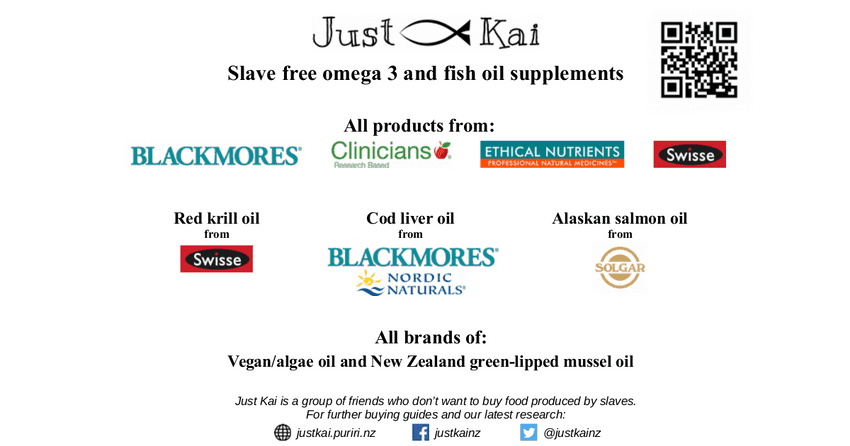Some months back one of our neighbours asked us if the cod liver oil she takes is slave free. It’s been a bit of a challenge to find an answer, but we now have good news and bad news. The bad news? We’re not confident the brand she’s been taking is slave free. But the good news? We’ve identified two other brands we are confident are :-)
As well as looking into cod liver oil, along the way we looked into all major brands of fish oils and omega 3 supplements we found for sale either in supermarkets or online pharmacies. You can read our detailed findings here.
It turns out this is a pretty complicated area from a human welfare point of view. Most brands were keen to tell us about their quality standards and environmental standards, but it seemed few had seriously considered human welfare standards in their supply chain. And the supply chains aren’t trivial to trace: fish oils are usually made from what’s left over after higher value parts of the fish have been removed, and oil from different sources seems not uncommonly to be mixed together.
Further complexities we found were in the labelling of oil. A lot of fish oil is sold as being ‘Norwegian’: however, it turns out Norway is a major hub for the re-processing of fish oil, as well as being a major fish oil fishing nation. So ‘Norwegian’ oil may have been made from fish caught on Norwegian boats (which have excellent labour standards) or it could have been caught who-knows-where and simply re-processed there. You don’t know if you don’t ask.
It doesn’t help that the two major certifiers of fish oil basically only certify working conditions in factories (rather than on fishing vessels), even though all the worst abuses happen at sea rather than on land. And abuses can be severe: fish that produce lots of oil are typically cold-water fish, occurring in deep sea far from land. Ships are frequently at sea for months on end, making these fisheries at very high risk for forced labour: workers can be tricked onto them and then have no way to leave.
Still, we did find three companies we can recommend:
- Clinicians make their oil in Norway, from fish caught in Norway;
- Ethical Nutrients make their oil from fish caught in low-risk jurisdictions (mostly Peru), and has strict responses to human rights abuses when they are found to occur;
- Blackmores visit the fishing vessels that catch their fish in port and audit them for human rights abuses.
Particular products from other brands are also recommended, plus we have concluded that any brand of vegan omega 3s (which are made from algae) and any brand of New Zealand green-lipped mussel oil is fine.
You can read our full research here or download a summary pdf of our findings here.

